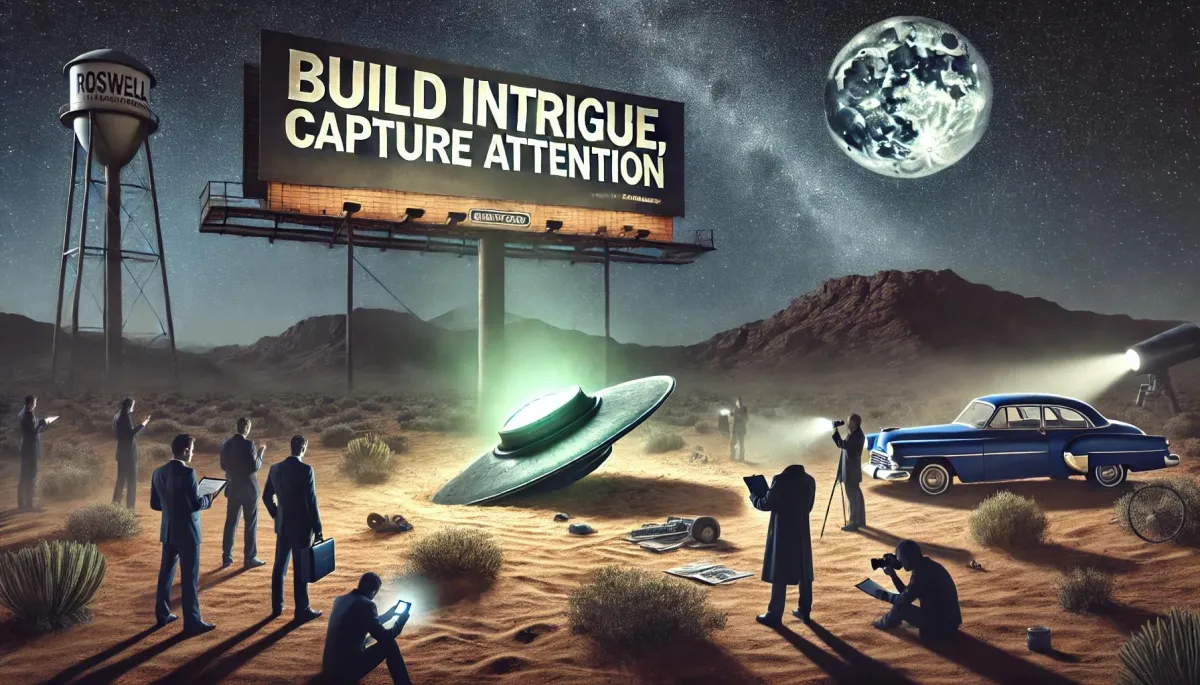Online Marketing Tips Blog
In this Daily blog, I'll try to answer the most burning questions for online marketing that I get in my consulting business. We help online business owners who are in affiliate marketing, coaching, eLearning and Online Events every single day. I'll share that info with you!

What Can the Roswell UFO Crash Teach Us About Marketing?
When you hear "Roswell UFO Crash," marketing probably isn't the first thing that comes to mind. Yet, the events surrounding Roswell in 1947—the supposed crash of an unidentified flying object and the subsequent government cover-up—hold valuable lessons for marketers. Whether you're looking to build intrigue, capture your audience's attention, or control the narrative during a PR crisis, Roswell offers a case study worth dissecting.
This blog explores what the Roswell incident can teach us about building stories, fueling curiosity, and handling messaging when things spiral out of control. By the end of this post, you'll have actionable ways to apply these lessons to your own marketing strategies and keep your campaigns compelling.
The Story of Roswell and Its Enduring Appeal
The crash near Roswell, New Mexico, in July 1947 has been the subject of fascination for decades. It all started with reports of a mysterious flying object, possibly alien in origin. The U.S. military initially admitted to recovering a "flying disc," only to backpedal days later, claiming it was merely a weather balloon.
To this day, some believe the government covered up extraterrestrial contact, while skeptics point to overactive imaginations. Regardless of where you stand, the Roswell story persists because of its perfect blend of mystery, speculation, and unanswered questions—a marketer's dream trifecta.
Now, let's break down the lessons marketers can take from this enduring tale.
1. Hook Your Audience with a Captivating Story
One reason the Roswell story is still alive today is that it captured people’s imaginations right from the start. Think about the buzzwords associated with Roswell—UFOs, aliens, flying saucers, conspiracy theories. These terms evoke curiosity and invite people to dig deeper.
How This Applies to Marketing:
• Create a Strong Hook: Capture attention immediately, whether through a bold headline, a unique product story, or a surprising video ad.
◦ Example: Netflix's early campaigns for "Stranger Things" leaned heavily on nostalgia and eerie intrigue, echoing classic sci-fi tales of the '80s. It propelled the series into cultural relevance before Episode 1 even aired.
• Appeal to Emotion: Stories that tap into curiosity, fear, or excitement are more likely to stick.
◦ For instance, Apple's "1984" Super Bowl ad broke the mold by representing a dystopian vision before positioning Apple computers as tools of liberation.
For marketers, the takeaway here is clear—stories don't need to be overly complex, but they must spark intrigue, just like the initial reports out of Roswell did.
2. Fuel Curiosity with Limited Details
The Roswell case gained traction because of what wasn't said. The initial government statement was quickly retracted, leaving a void that conspiracy theorists were all too eager to fill. People are wired to seek out missing information—it’s why cliffhangers are so effective in books, TV shows, and even marketing.
How This Applies to Marketing:
• Use the Power of Mystery: Tease your audience with just enough information to make them curious.
◦ Example: Pre-launch campaigns for tech products often use blurred images or partial reveals to drive anticipation—think of how OnePlus teases its smartphone designs.
• Create a Narrative Arc: Spread out the delivery of content to keep your audience engaged over time.
◦ Example: Nike’s "You Can’t Stop Us" campaigns dropped content in phases, allowing the brand to dominate the conversation for weeks.
Remember, unanswered questions are an invitation for engagement. Create opportunities for your audience to explore your brand from multiple angles.
3. Leverage Controversy (Carefully) to Stay in the News
Roswell was controversial from the start. Was it a UFO? A weather balloon? An elaborate cover-up? That debate turned the story into a cultural phenomenon. Like it or not, controversy captures attention—if handled correctly, it can keep your brand top-of-mind.
How This Applies to Marketing:
• Strategically Controversial Messaging: Take a bold stance on industry norms or challenge the status quo.
◦ Example: Patagonia's "Don't Buy This Jacket" ad directly challenged consumerism during Black Friday. This sparked massive debate but ultimately showcased the brand's environmental commitment.
• Plan for Pushback: If you're going to lean into controversy, have a strategy for addressing backlash.
◦ Example: Nike's campaign featuring Colin Kaepernick stirred intense debate but resonated strongly with their target audience, driving sales and brand loyalty despite the polarizing nature of the ad.
When done well, controversy can define your brand's voice and strengthen customer loyalty.
4. Control the Narrative Before Someone Else Does
One of the biggest mistakes in the Roswell story was how poorly the narrative was handled. The government’s initial acknowledgment of a “flying disc” created widespread fascination, but the retraction muddied their credibility. Without clear messaging, alternative theories filled the void.
How This Applies to Marketing:
• Have a Crisis Plan: If your campaign faces criticism or your product under-delivers, be proactive in addressing the narrative.
◦ Example: When Domino’s faced criticism about pizza quality in the late 2000s, they launched the “Turnaround” campaign, openly addressing the feedback while showcasing their improvements.
• Communicate Clearly and Consistently: Mixed messages lead to lost trust. Ensure your internal teams and external communication are aligned to avoid confusion like the one surrounding Roswell.
Control your messaging and stay transparent—you’ll maintain your audience’s trust even in difficult moments.
5. Build a Community Around Your Message
Over the years, the Roswell incident has spawned an entire subculture. From UFO festivals to alien-themed merchandise shops, Roswell transformed into a hub for enthusiasts. This wasn’t just a story—it became a movement.
How This Applies to Marketing:
• Foster a Community: Create space for your customers to connect, share, and rally around your brand.
◦ Example: Starbucks used My Starbucks Idea to give customers a voice in shaping the brand, boosting loyalty and interest.
• Engage Through Shared Values: Brands that align with their audience's values foster emotional connections.
◦ Example: Peloton’s fitness community thrives on shared goals and experiences that extend beyond just workouts.
Give your audience a reason to feel part of something bigger, and they’ll stick around for the long haul.
Marketing Lessons You Shouldn't Forget
The Roswell crash teaches us that engaging marketing is as much about what you do say as what you don’t. It’s about crafting compelling narratives, sparking curiosity, and ensuring your messaging is consistent, even in challenging moments.
These are not just lessons from an old UFO tale—they’re tools that can elevate your brand and help you connect with your audience in ways that are memorable, meaningful, and magnetic.
Don’t wait for your “Roswell moment.” Create it. By combining storytelling, intrigue, and strategic messaging, you can drive engagement and differentiate your brand in a crowded marketplace.
One of the best ways to do this, is to explore the Write Like Dan free masterclass. Learn to write with the intrigue of Dan Kennedy, legendary marketer and still the GOAT in this industry. Follow this link for more.
Disclaimer: If you click on links we provide and make a purchase, we may receive compensation. There is never any guarantee of income in any of the links or programs we provide.
If you have specific questions you would like to see answered in this blog, please send them to me at [email protected]. I will try to address every question here.
If you follow the links in my blog, some of them will be affiliate links and I will be compensated if you purchase a course or product from these links. This is no way increases your price or changes my opinion on these courses. I only recommend things I use in my business.
For the absolute best training online for Affiliate Marketing, Coaching, Events & Masterminds and eLearning - Online Courses: Check out our Flagship Program Here.

Copyright © 2025 | All Affiliate Cash | All Rights Reserved
There may be affiliate links on these pages. When you follow them and purchase something, I may be paid a commission. This does not raise your cost of the item, and does not influence my opinion or review of the item in any way.
NOT FACEBOOK™: This site is not a part of the Facebook™ website or Facebook Inc. Additionally, This site is NOT endorsed by Facebook™ in any way. FACEBOOK™ is a trademark of FACEBOOK™, Inc.

